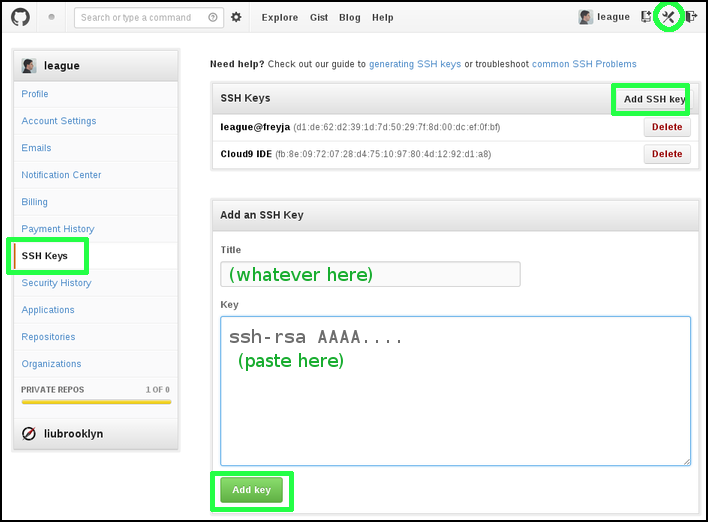Generate Ssh Key On Mac For Git
- Sep 26, 2019 Now you must import the copied SSH key to the portal. After you copy the SSH key to the clipboard, return to your account page. Choose to Import Public Key and paste your SSH key into the Public Key field. In the Key Name field, provide a name for the key. Note: although providing a key name is optional, it is a best practice for ease of.
- Aug 08, 2016 Do you hate typing in your username and password for GitHub everytime you make a push? Well that ends today because we are going to learn to generate an SSH key for our computer and to attach it.
- Dec 20, 2015 - Go to your settings page (by click your Profile Icon on the top right of the screen, and clicking 'settings'.
- Generate Ssh Key On Mac For Git Code
- Generate Ssh Key On Mac For Giti
- Generate Ssh Key Mac For Gitlab
- How To Generate Ssh Key
Nov 26, 2019 Azure DevOps will encrypt the data sent to you with that key when you work with Git. You decrypt the data on your computer with the private key, which is never shared or sent over the network. SSH is a great option if you've already got it set up on your system—just add a public key to Azure DevOps and clone your repos using SSH. Generating a new SSH key. Open Terminal Terminal Git Bash. Paste the text below, substituting in your GitHub Enterprise email address. $ ssh-keygen -t rsa -b 4096 -C 'youremail@example.com' This creates a new ssh key, using the provided email as a label. Generating public/private rsa key pair.
This guide goes through setting up SSH keys on macOS Mojave 10.14 back to Mac OSX 10.11 and also a secure password-less SSH connection between a local macOS workstation and a remote server also running a Linux variant operating system.
The process requires generating a public and private key on the local computer and then adding the public key to the remote servers authorised list. What is great about this is that it allows a password prompt free session, handy for a lot of uses.
First thing that you need to do on your macOS machine is to create a directory that will store your SSH keys. Then you will generate a public and private key for your account, launch the Terminal and punch in some commands:
Create a .ssh Directory
Change to the home directory
Create a SSH directory name .ssh and move into it
Make sure that the file permissions are set to read/write/execute only for the user
Create your private and public key, the blank quotes at the end of the command gives the private key no password, so allowing for passwordless logins!
Change into the .ssh directory and list the contents of that .ssh directory
Thats your SSH keys created, the private key is the id_rsa and the public one is the id_rsa.pub, don’t give out the private one always keep that one only on your local machine.
 Wep key free download - WEP Key Generator, Wifi Password - WEP Key, WEP and WPA keygenerator, and many more programs.
Wep key free download - WEP Key Generator, Wifi Password - WEP Key, WEP and WPA keygenerator, and many more programs.
Sharing the Public Key
Create an authorized_keys in the .ssh directory of the remote computer that you want to connect to.
Generate Ssh Key On Mac For Git Code
You can create automatic logins by adding the contents of your public key to the authorized_keys file on the remote device.
To see and copy your public key use the cat command and copy the contents:

On the remote computer if needed, change the permssions on the authorized_keys file to write to add the public key, on a new line paste in your public key, and change permissions back to read only after for security.
Allow write on authorised_keys
Paste the entire id_rsa.pub content with vi or nano into the authorized_keys file, if using nano use the -w flag to not use incorrect line breaks.
If the remote host does not have an “authorized_keys” file simply create one and after the public key is pasted in don’t forget to takeaway write permissions.
Going Both Ways
So now when you connect via SSH no password is prompted as the remote computer has your public key which is only decrypted by your private key held in your local .ssh/ directory. If you want the communications to be bilateral then repeat the process in the opposite order between the two.
Now the two computers can securely connect with no password prompting, making it ideal to script between the two for file copies or back ups.
Doing it Quicker
Generate Ssh Key On Mac For Giti
Now instead of typing in
Make an alias in your bash shell you could alias it to
Generate Ssh Key Mac For Gitlab
Reload the the shell
How To Generate Ssh Key
Then all you have to type in is the alias